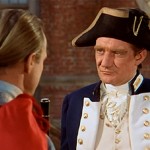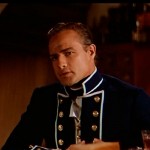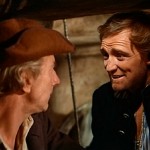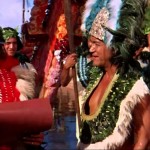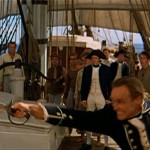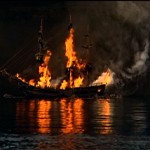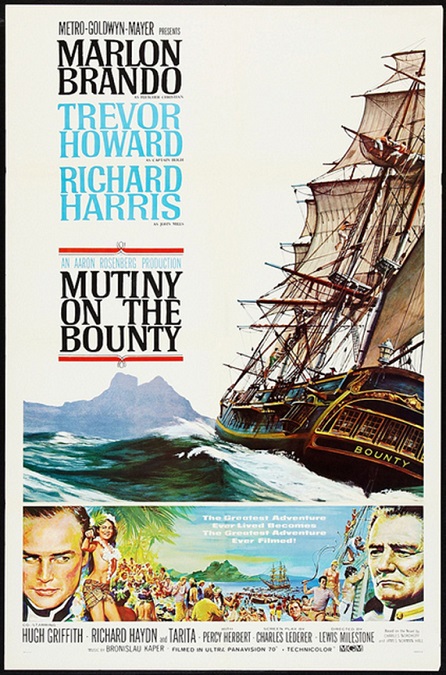
Mutiny on the Bounty – 1962
This is the 2nd time a version of Mutiny on the Bounty has been nominated for Best Picture. The first time was in 1935, and it starred Clark Gable and Charles Laughton. That one took home the Oscar for Best Picture. This one starred Marlon Brando playing the head mutineer, Fletcher Christian, and Trevor Howard as the evil Captain Bligh.
So the first thing I was looking for when I was watching this movie was the differences between the two films. What was it that made the producers decide that a new version needed to be filmed? Was anything significantly changed? Besides the fact that this version was filmed in color, I think the biggest thing was the ending. In the 1935 version, the film ended with Christian and his men arriving at Pitcairn Island where they make plans to develop a utopian society. This film actually goes into the tragic aftermath where the mutineers devolve into criminals and turn on each other, though in reality, their criminal behavior was actually worse that the film depicted.
Another difference is that this film version placed a lot more emphasis on the romance between Lieutenant Christian and his Tahitian woman Princess Maimitti, played by Tarita TeriiPaia. Another thing which I felt the movie devoted significant time to was the free-love attitudes of the Tahitian culture, though when I consider the year in which it was made, I suppose I shouldn’t be too surprised.
But in watching this particular version, I still have the same problem that I had with the 1935 film. So, because both films were based on the same source material, the original novel by Charles Nordhoff and James Norman Hall, I have to assume that the fault lies there. The character of Captain Bligh was so mean, cruel, and downright stupid, that he was practically unbelievable. And my research supports my opinion. The real William Bligh was not as evil as the film depicts.
The real Bligh was no crueler than any other Naval Captain, though he had a habit of insulting people out of turn. According to my research, he was vain and was quick to call others incompetent. The real Bounty’s log shows that Bligh resorted to punishments relatively sparingly. He scolded when other Captains would have whipped, and whipped when other Captains would have hanged. And I also found it interesting to note that he and Fletcher Christian had been friends for many years.
The reason why the real crew mutinied is not entirely clear. It is thought by many that the inexperienced crew simply wasn’t used to the rigors of life at sea and the carefree time they spent in Tahiti made them reluctant to return to their difficult duties on the Bounty. But, of course, the film depicts the mutineers as the heroes. They are so mistreated and wrongfully abused by the evil Captain, they seemed to have no choice but to rebel.
And the sadistic depths to which the character of Bligh sank were tantamount to outright murder. Through his stupidity and inability to take responsibility for the failures of the Bounty’s mission, the crew was being picked off, one by one. He made bad decisions which cost them time and lives, and he blamed it all on the inadequacies of the crew. The character actually made a point of saying that cruelty with a purpose is not cruelty at all. It is efficiency. That is one messed up way of thinking.
Now, I feel that something else I found in my research must be mentioned. The more I hear and read about Marlon Brando, the actor, the less likable I find him to be. He had monstrous ego which was so bad that would tell the directors how to do their jobs. As paraphrased from Wikipedia, the film’s first director was Carol Reed, however, behind the scenes, Brando effectively took over directing duties himself, causing the film to become far behind schedule and way over budget. This resulted in Reed pulling out of the project. He was replaced with Lewis Milestone.
And finally, a quick mention of two things I liked and one I didn’t. I liked Richard Harris as one of Christian’s fellow Mutineers. I also liked a funny moment in which Bligh has to order Christian to make love to Princess Maimitti so as not to offend the Chief. But I didn’t like how the Chief, in general, was portrayed as a laughing moron. It seemed very racist to my modern sensibilities.

